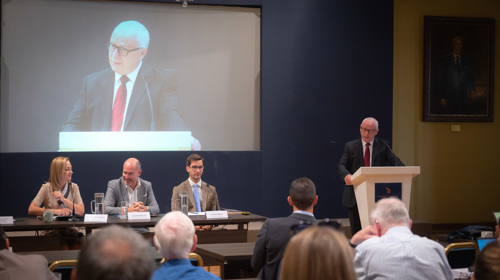Ombudsman addresses European Roundtable on AI and Human Rights
Published September 30, 2025

The Parliamentary Ombudsman, Judge Joseph Zammit McKeon, was invited by the Malta Chamber, the Malta Business Bureau and the General Workers Union to speak at the European Roundtable Discussion held on 30 September 2025 at the Malta Chamber in Valletta.
The event formed part of the EU-funded TransFormWork 2 project, which explores the impact of Artificial Intelligence (AI) in the workplace and promotes a fair and human-centred transition towards digitalisation. The project brings together European social partners to develop common guidelines on the responsible use of AI while safeguarding fundamental rights.
Panel on regulatory and ethical dimensions of AI
Judge Zammit McKeon was a panellist in the session Regulatory and Ethical Dimensions of AI, alongside Kenneth Brincat (CEO, Malta Digital Innovation Authority), Dr Patrick Massa (WH Partners), and Prof Alexiei Dingli (University of Malta).
In his intervention, the Ombudsman stressed that AI must always remain subject to human rights principles. He highlighted that while AI offers opportunities, it also raises significant risks related to privacy, data protection, bias, and discrimination. He pointed to Article 8 of the European Convention on Human Rights, which guarantees the right to respect for private life, and explained how AI systems that collect or process personal data must comply with these standards.
Drawing on European Court of Human Rights case law, he gave examples of how mass surveillance, automated profiling, and facial recognition have already been found to breach fundamental rights. He underlined that laws must provide clear safeguards against arbitrary interference, and that AI technologies must not undermine individual dignity, equality, or freedom of expression.
The Ombudsman’s role in accountability
Judge Zammit McKeon emphasised that oversight institutions like Ombudsman offices play an essential role in ensuring accountability and fairness when public authorities use AI systems. He stressed that algorithmic transparency and human oversight are not optional, but vital, to protect vulnerable groups and ensure decisions do not unjustly affect people’s lives.
The Ombudsman concluded that while innovation is to be welcomed, human rights and the rule of law must remain the guiding framework for AI regulation and use. He called for closer collaboration between governments, social partners, technology developers, and civil society to promote transparency, accountability, and education about AI’s impact on everyday life.
Broader context
The roundtable gathered social partners and experts from across Europe, including representatives from Italy, Bulgaria, Romania, Cyprus, Ireland, Poland, and Malta, as well as the European Trade Union Confederation.